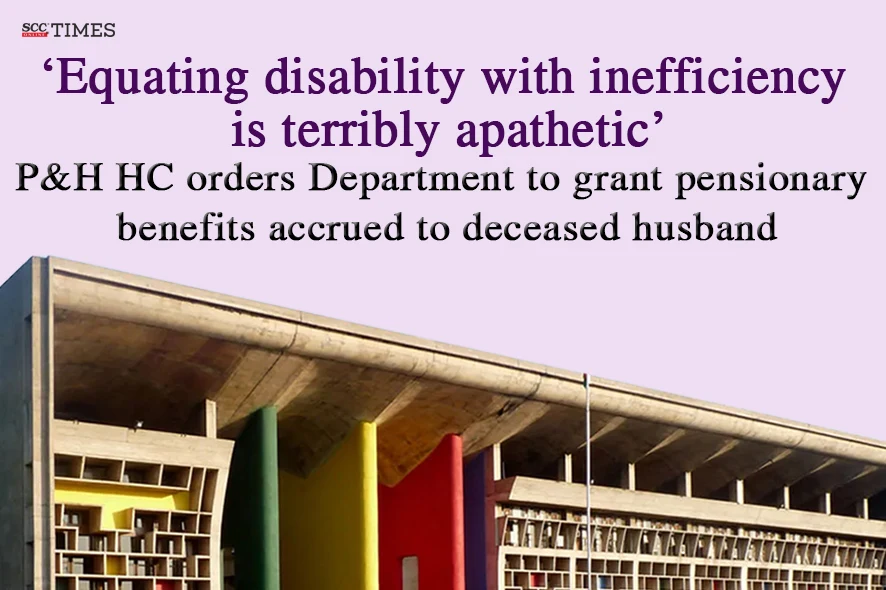Punjab and Haryana High Court: In the present case, a petition was filed under Article 226 of the Constitution to quash an order passed by Respondent 3, whereby the invalid pension and family pension availed by the petitioner-wife from January 2019, was withdrawn. A Single Judge Bench of Harpreet Singh Brar, J., opined that it was regrettable that the respondent-Department had chosen to equate disability sustained by the husband of the petitioner in an accident with inefficiency as this perspective was not only expressly illegal but also terribly apathetic. The Court thus directed the Department to grant the pensionary benefits accrued to the deceased husband of the petitioner including family pension, within eight weeks along with the arrears accumulated at an interest of 7.5% p.a.
Background
In the present case, the husband of the petitioner joined the service of Respondent 1 as a work-charge employee in November 1969. He was regularized in May 1979 and joined as an ALM. Unfortunately, he had a non-fatal electric accident that resulted in amputation of his upper right limb and index finger of the left hand. The degree of his disability was assessed to be 90%. Because of this permanent disability, his employment was terminated with effect from January 1983 without granting him any pension. Thereafter, the husband of the petitioner passed away in January 1988.
The petitioner moved a representation claiming invalid pension of her late husband till January 1998 and thereafter, the family pension, which was granted by predecessor of Respondent 3 in consonance with Rule 5.12 of the Civil Services Rules Vol. II (‘CSR’). The petitioner was regularly receiving family pension and had also received the arrears of pension of her deceased husband.
However, the same was withdrawn by Respondent 3 upon the advice of Legal Remembrancer, Haryana Power Utilities. The advice also stated serving a show cause notice upon the petitioner, which Respondent 3 did not take into account. Then, the legal branch of the respondent-Corporation advised Respondent 3 to restore Family Pension to the petitioner till the final decision of the notice served upon the petitioner. In pursuance thereof, Respondent 3 issued a show cause notice to the petitioner.
The petitioner contended that issuance of the same after the effective action, was in violation of principles of natural justice and that Respondent 3 had misinterpreted Rule 2.5 of CSR. On the other hand, the respondent-Corporation contended that the benefits under Rule 5.12 of the CSR could only be used if the employee had been incapacitated due to an injury sustained while performing his official duties.
Analysis and Decision
The Court opined that the respondent-Corporation could only be incurred with the liability to pay pension if the injuries were sustained by the husband while performing his official duty. The Court found it curious that the Department could place the burden on the petitioner to prove that her husband sustained injuries while on duty since the official records were unavailable as they were ruined during the flood that occurred in Shahbad in 1997.
The Court further stated that the petitioner and her husband could not be expected to produce the duty record of the husband, especially post his death, while there was a reasonable expectation for the Department to possess the same as all service records were in its exclusive custody. The Court held that the callousness displayed by the Department was inherently unjustifiable and did not deserve any condonation.
After considering Rules 2.5 and 5.12 of the CSR and Sections 47 and 72 of the Persons with Disabilities (Equal Opportunities, Protection of Rights and Full Participation) Act 1995, the Court opined that the law explicitly prohibited the approach adopted by the Department. Further, the Court viewed that it was regrettable that the Department chose to equate disability sustained by the husband of the petitioner in an accident with inefficiency as it was not only expressly illegal but also terribly apathetic.
The Court stated that the hyper-technical and insensitive approach taken by the Department was contrary to not only the applicable Rules but also the principles of equity. Considering that once a competent authority passed an order, the successor would not review the same as the law of estoppel would come into play, the Court opined that Respondent 3 chose to review and revise the order of his predecessor granting the invalid pension to the petitioner for reasons unbeknownst. The Court observed that an arbitrary review of a predecessor’s order was impermissible in law if the same was not void or contrary to the statutory provisions. Thus, the Court opined that Respondent 3 exceeded his powers by ordering withdrawal of pensionary benefits accrued to the petitioner.
The Court allowed the petition and directed the Department to grant the pensionary benefits accrued to the deceased husband of the petitioner including family pension to the petitioner within eight weeks. Further, the Court also directed the Department to release the arrears accumulated by the petitioner at an interest of 7.5% p.a.
[Bachan Kaur v. Uttar Haryana Bijli Vitran Nigam Ltd., 2025 SCC OnLine P&H 5909, decided on 11-8-2025]
Advocates who appeared in this case:
For the Petitioner: J.S. Maanipur, Advocate and Harpreet Kaur, Advocate
For the Respondents: Gaurav Jindal, Advocate



